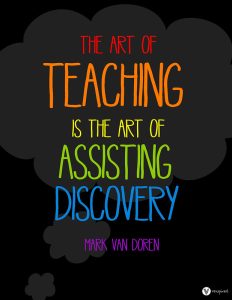Learning in the age of advanced technology and AI is a great opportunity for both learners and educators.
Much of the teaching and learning is now being conducted on virtual platforms, which undoubtedly requires users to know how to manage computers, the Internet and technology well. In other words, developing digital literacy now holds a prominent position in education. In this context, as ESL teachers working with various proficiency levels, our job with elementary learners who lack enough digital literacy might require more effort to handle both fronts successfully. We should be mindful of the fact that handling both language learning and digital literacy is quite challenging for learners, and the reasons why some adults are struggling with digital literacy is also important if we want to help them overcome this challenge. So, in this blog post, I’ll point out why some learners at the basic level are struggling with technology in their learning and suggest how teachers can help them overcome these problems.
In other words, developing digital literacy now holds a prominent position in education. In this context, as ESL teachers working with various proficiency levels, our job with elementary learners who lack enough digital literacy might require more effort to handle both fronts successfully. We should be mindful of the fact that handling both language learning and digital literacy is quite challenging for learners, and the reasons why some adults are struggling with digital literacy is also important if we want to help them overcome this challenge. So, in this blog post, I’ll point out why some learners at the basic level are struggling with technology in their learning and suggest how teachers can help them overcome these problems.
Tag Archives: learning
Helping Unsuccessful Listeners
 One of the main challenges that ESL students face both in language learning in general and in listening skills specifically, is how to improve! Often, not surprisingly, one of the teachers’ frustrating questions is how to help their students overcome their difficulties. In fact, they should both know that if they place their focus on the listening process, they can improve listening skills, and achieve successful comprehension. In this blog post, I’d like to highlight the problems that students deal with in this process, and how we can better assist them as teachers. Continue reading
One of the main challenges that ESL students face both in language learning in general and in listening skills specifically, is how to improve! Often, not surprisingly, one of the teachers’ frustrating questions is how to help their students overcome their difficulties. In fact, they should both know that if they place their focus on the listening process, they can improve listening skills, and achieve successful comprehension. In this blog post, I’d like to highlight the problems that students deal with in this process, and how we can better assist them as teachers. Continue reading
Establishing Rapport with Learners: Challenges & Solutions

Teaching is a rewarding profession, but it does come with its challenges. One important aspect of teaching is to establish a rapport with the learners. A teacher who is unable to communicate with her learners in the first few days is at risk of “losing” her class altogether. Research shows that learners learn better when they find the content interesting and like the teacher! In fact, a positive and favourable learning environment is necessary for effective communication in a classroom that learners find safe and supportive. This article will pose some challenges and offer solutions that will ensure student engagement.
Language Ego and ESL
The concept of language ego is intriguing.

People usually discuss ego in psychological terms. In linguistics, however, language ego is seen as a normal and natural byproduct of learning a second language, which has everything to do with the affective part of language learning.
The Importance of Selecting Appropriate Reading Materials – How to Help Learners Find the “Right” One
Learners often come to me with questions about their English reading materials. They wonder if the books they’ve chosen are good for practicing English or why certain expressions differ from what they hear daily. For instance, one of my students asked why “you shall” was used in a text. This highlighted a common issue: many learners struggle to distinguish between reading for pleasure and reading to learn English as a second language. This leads to a vital question: How does one choose a book that benefits English learning? However, selecting the right materials involves more than just finding any English text—it requires careful consideration of the learner’s proficiency level and the regional variation of English they are exposed to.
Continue readingStudent Engagement Strategies That Work
As the day wears on, it’s not uncommon to see learners becoming unfocused, disengaged with classroom tasks, restless, noisy or silent. The most demotivating aspect of disinterested students is their unwillingness to learn. A Gallup student poll (2014) reports that nearly 50% of the learners were “either not engaged (28 percent) or actively disengaged (19 percent) in school” (Collier, 2015).
Make Your Word-Processed Documents More Accessible
Most of us are aware of the importance of the issues around digital accessibility through our own disabilities and supporting our students in virtual and blended classrooms. Some organizations offer accessibility training for educators and learners. Due to accessibility legislation and policies, software vendors build accessibility features into their wares. This opportunity allows us to make our documents more accessible. This post suggests some features available in the Microsoft Word app that instructors may leverage to make their digital documents more accessible. Please be aware that this is not a comprehensive accessibility resource, but an introduction for interested educators. Continue reading
Simplifying Real-World Content with ChatGPT and the Canadian Language Benchmarks
Lesson planning can be a time-consuming endeavor, especially for educators teaching students with lower levels of English proficiency. Adapting materials to meet the needs of these learners requires careful consideration and often entails significant effort. However, with the assistance of tools like ChatGPT, this process can be streamlined and made more efficient.
Continue readingAI in ESL: Empowering Learners and Bridging Language Gaps
By Margaret Holec
Introduction
The past decade has seen a game-changing impact on English as a Second Language (ESL) education, thanks to Artificial Intelligence (AI). Notably, AI has made students more independent in their learning, helping them secure jobs even with lower English levels. Additionally, direct translation of messages and emails has become seamless, enhancing communication.
1. Independent Learning: AI’s Role in Student Empowerment
AI in ESL education has shifted the focus to personalized learning, allowing students to learn at their own pace. This independence builds confidence and self-reliance as learners navigate language acquisition with tailored support.
Continue readingLearner’s Autonomy! Is it for all learners?

As an ESL teacher with over a decade of progressive teaching experience, no notion in English language pedagogy was as mind–blowing to me as the idea of learner autonomy. The way that learning and learners are seen as autonomous has always resonated highly with me; I always thought if anyone masters independent learning, they can learn almost anything with joy and efficiency. Recently, however, I’ve been thinking differently about this. Not because I am now a skeptic of this approach, but because I have been wondering if all learners want to be independent learners! Based on my recent encounters and experience at work, I now think maybe there are some learners who learn best without being independent. In this blog post, I’d like to share my own experience with this type of learner. Continue reading





